
Viking Names
Algarthorpe
Algarthorpe, in the Broxtow Wapentake of Nottinghamshire, comes from the Old Norse male personal name Álfgeirr the Old Norse element þorp ‘outlying farm, settlement’. Algarthorpe is a deserted medieval village near Basford, Nottinghamshire.
Read More
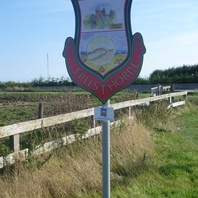
Viking Names
Trusthorpe
Trusthorpe, in the Calceworth Wapentake of Lincolshire, comes from the Old Norse male byname Strútr and Old Norse þorp ‘a secondary settlement, a dependent outlying farmstead or hamlet’. The same personal name appears in Strubby, Lincolnshire, but here the initial S- has been lost through dissimulation.
Read More
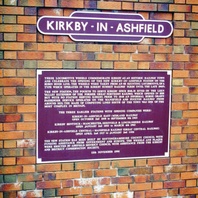
Viking Names
Kirkby in Ashfield
Kirkby in Ashfield, in the Broxtow Wapentake of Nottinghamshire, comes from Old Norse kirkja ‘a church’ and Old Norse bý ‘a farmstead, a village’. Ashfield is an old district name from Old English aesc ‘ash-tree’ and feld ‘open country, unencumbered ground’, though no mention of it has been found except in connection to Kirkby and Sutton in Ashfield, Nottinghamshire.
Read More
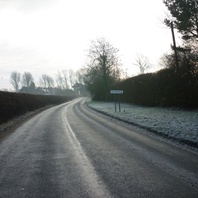
Viking Names
Stixwould
Stixwould, in the South Riding of Lincolnshire, is a hybrid place-name from the Old Norse male personal name Stigr and Anglian wald ‘a forest; high forest-land’, which is topographically appropriate.
Read More
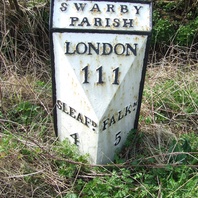
Viking Names
Swarby
Swarby, in the Aswardhurn Wapentake of Lincolnshire, is an Old Norse compound formed from the male byname Svarri and by ‘a farmstead, a village’. Swarby is a joint parish with Aswarby.
Read More
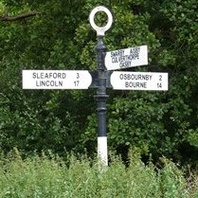
Viking Names
Aswarby
Aswarby, in the Aswardhurn Wapentake of Lincolnshire, is a compound name formed from the Old Norse male personal name Ásvarðr and Old Norse by ‘a farmstead, a village’. The construction of the place-name is identical with that of Aswardby, in the South Riding of Lindsey in Lincolnshire. Ásvarðr is also the first element in the district name, Aswardhurn, and presumably both the settlement and the district names refer to the same man. Aswarby is now a joint parish with Swarby.
Read More
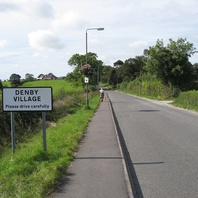
Viking Names
Denby
Denby, in the Morleyston and Litchurch Hundred of Derbyshire, takes its name from the Old English ethnonym Dene ‘a Dane’ and Old Norse by ‘a farmstead, a village’. Traditionally, the place-name has been interpreted as referring to a settlement of Danes. However, the exact implications of such a name are not yet fully understood and are the subject of ongoing work by Dr Jayne Carroll of the Institute for Name-Studies, University of Nottingham.
Read More
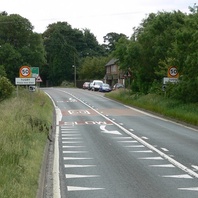
Viking Names
Tugby
Tugby, in the East Goscote Hundred of Leicestershire, is a Scandinavian compound from the Old Norse male personal name Tóki and Old Norse by ‘a farmstead, a village’. In the Domesday Book, a Tochi is recorded as holding Tugby as part of a larger estate. It is now a joint parish with Keythorpe.
Read More
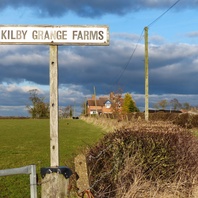
Viking Names
Kilby
Kilby, in the Guthlaxton Hundred of Leicestershire, was probably an Old English compound from Old English cild (cilda genitive plural) ‘a child, a young person, a boy, a son (usually implying noble birth)’ and Old English tun ‘an enclosure; a farmstead; a village; an estate’. The place-name underwent Scandinavianization with the generic tun being replaced with Old Norse by ‘a farmstead, a village’ and the use of an initial Old Norse k for the Old English initial ch.
Read More
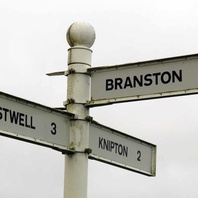
Viking Names
Knipton
Knipton, in the Framland Hundred of Leicestershire, is a Anglo-Scandinavian hybrid from Old Norse gnípa ‘a steep rock or peak’ and Old English tun ‘an enclosure; a farmstead; a village; an estate’. The name is topographically appropriate as the village lies in a narrow valley with hills rising steeply on each side. Pagan Anglian burials here suggest an earlier Old English place-name that was replaced with Scandinavian settlement.
Read More
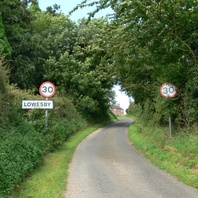
Viking Names
Lowesby
Lowesby, in the East Goscote Hundred of Leicestershire, is a difficult name. The first element possibly comes from the Old Norse male byname Lauss/Lausi ‘loose-living’. Alternatively it has been suggested that the first element could be derived from the postulated Old Norse element lausa ‘a slope’ which is found in Scandinavian place-names in the forms -lösa/-löse; however, this element was no longer used for place-naming by the time of Scandinavian settlement in England. The second element is Old Norse by ‘a farmstead, a village’.
